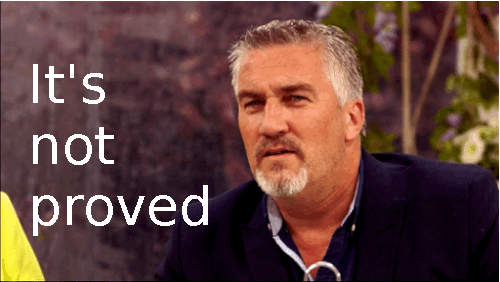Who could have guessed that this non-story about somebody being out of his depth and quite obviously wrong would get so out of hand? Here’s an update on The Continuing Tale Of The Man Whose Claims Couldn’t Be Verified.
Newspapers take the story hook, line and sinker
- Telegraph ran with it, but later quietly updated to say Enoch “claims” to have solved the problem. Colin Wright wasn’t impressed.
- Independent, illustrated with a picture of a blackboard showing mathematics written in Amharic, the Ethiopian script. (Please say they didn’t just search for “africa mathematics” on Getty Images and take the first photo without any women or children in it)
- Daily Mail ran with it, and plagiarised a Numberphile video to boot (now removed).
- india.com can’t contain its amazement.
- The Metro had a story, but have quietly deleted it. Oh, the fast-moving world of journalism!
All the points to CNN, whose first piece was skeptical about his claims (they’ve since rewritten it, with a response from Enoch – more on that later). Points awarded and then immediately taken away from Quartz, who ran a piece about how Enoch had “fooled the British media”, but illustrated it with a picture of a completely unrelated South Sudanese school teacher.
The Riemann hypothesis isn’t a completely obscure mathematical problem that nobody has heard of outside a few ivory towers. I found stories on entertainment.ie and Boing Boing that refer to the problem, published in the days before Enoch’s claim came out.
Some “proofs” of the Riemann hypothesis on the arXiv
People come up with “proofs” of the Riemann hypothesis all the time. To show just how common this is, I searched for “riemann hypothesis” on arxiv.org, and came up with this lot:
- On the Riemann Hypothesis, by Gerasimos Pergaris in December 2012.
- Constructing a Proof of the Riemann Hypothesis, by Ross C. McPhedran in August 2013.
- A Geometric Proof of Generalized Riemann Hypothesis, by Kaida Shi in July 2003.
- The Riemann hypothesis proved, by Agostino Prástaro in May 2013.
- Proof of the Riemann’s hypothesis, by S.V. Matnyak in April 2014.
- The Riemann Hypothesis and the possible proof, by Jin Gyu Lee in February 2014.
- One from 2008 on slashdot.
- One from 2014 that we must have missed (and the world’s media didn’t latch on to)
- And just for a change, here’s someone who says the hypothesis doesn’t hold: Riemann hypothesis is not correct, by JinHua Fei in July 2014.
That’s just two pages into the search results. There are loads more.
By the way, this is not a claimed proof and it contains real maths, but the title is fascinating anyway: The Sound of Fractal Strings and the Riemann Hypothesis. Fractal strings!
The BBC corrects itself
We mentioned that Marcus du Sautoy had been on the Today programme to talk about the claims. Marcus has put the relevant excerpt on Soundcloud, for easy access:
Marcus swiftly poured water on the claim that Enoch’s proof has been accepted, and heroically managed to only plug his book The Music of the Primes twice.
Our piece seemed to become the critique of record for the whole story, so Katie Steckles was invited on Radio 4’s More or Less to explain what’s going on. Assuming it doesn’t get cut, that episode will be broadcast tomorrow.
And finally, the World Service updated the blurb underneath their interview with Enoch to add the following mollifying disclaimer:
(The interview was conducted with Dr Enoch on the basis that his solution is correct and that he has won the prize.)
To which I’d like to add: (which it isn’t, and he hasn’t). I bet the reporter won’t make this mistake again!
Enoch insists he’s right
The saga continues. Nigerian mathematician Opeyemi Enoch insists he HAS solved Riemann hypothesis. https://t.co/fwQfaOcwHI @aperiodical
— Alex Bellos (@alexbellos) November 19, 2015
CNN, one of the few outlets to lead with skepticism instead of blind acceptance of Enoch’s claims, has now talked to him. He’s repeated his claim that he has a proof. Furthermore, the conference organiser Nina Ringo (she of the fuzzy logic and poetry) has backed him up.
He’s still wrong, of course: much like being cool or not smelling like off milk, having a proof of a mathematical statement is something only other people can say about you, not something you can say about yourself.

Oh I don’t know, cool people tend to have a very good opinion of themselves and be quite unabashed about saying they’re cool :)
When we’re done with the Nigerian Riemann, we’ll deal with the Guinean Goldbach. There is simply no end to it.
https://www.google.nl/amp/s/afrolegends.com/2013/03/25/a-guinean-solves-a-270-years-old-mathematic-problem/amp/